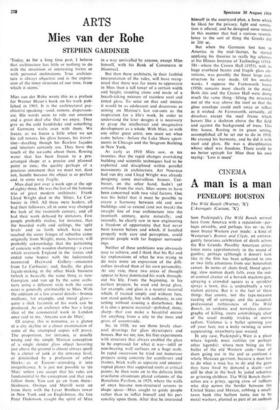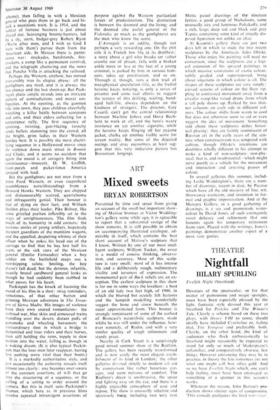CINEMA
A man is a man
PENELOPE HOUSTON
The Wild Bunch (Warner, 'X') L'Asfragale (Curzon, 'X') Sam Peckinpah's The Wild Bunch arrived here from America with a reputation—per- haps enviable, and perhaps less so—as the most brutal Western ever made: a kind of Westerner's Bonnie and Clyde, an extrava- gantly ferocious celebration of death across the Rio Grande. Possibly American critics listen more apprehensively to the sound of gunfire; perhaps (although it doesn't look like it) the film has been subjected to one or two little attentions from our benevolent censor. In terms of shots fired, blood spurt- ing, slow motion death falls, even the out- of-control chatter of a berserk machine-gun, spraying a crowded square as a sprinkler sprays a lawn, this is undoubtedly a very violent picture. But it is the feel of these things that counts, not the tape-measure reading off of carnage; and the accepted, professional ruthlessness of The Wild Bunch, its sardonic and nerveless choreo- graphy of killing, steers astonishingly clear of the usual muddy trickles of movie sadism. Violence is a bullet spinning you off your feet; not a knife twisting in some suppurating, strawberry-jam wound.
In any case, Peckinpah's West is a place where legends meet realities (or perhaps other legends): where men biting on the bullet of the old Western code—four of them going out in the end to confront a whole Mexican garrison, because a man has to do what a man has to do and the guns they have lived by demand a death—can still be shot in the back by jaded seiioritas or grinning children. The Wild Bunch them- selves are a grimy, ageing crew of ruffians who skip across the border between the United States and Mexico, robbing a small- town bank (the bullion turns out to be metal washers, planted as part of an ambush
scheme), then falling in with a Mexican general who pays them to go back and hi- jack a munitions train. It is 1914, and the soldier of fortune business is just about played out. Scavenging bounty-hunters, led by a sly, stern, badger-grey Robert Ryan (.We're after men, and I wish to God I were with them') pursue them from the American side. In Mexico there is panto- mime war: stockades, bandstands, fire- crackers, a camp like a permanent carnival, and the telegraph chattering out the news that Pancho Villa is attacking the railroad.
Perhaps the Western, anyhow, has moved irreversibly into its elegiac phase: all the gunfighters are tired, and it is always the last chance and the last shoot-up. But Peck- mpah plaits simple strands into an intricate pattern of contradictions and moral am- biguities. At the opening, as the gunmen ride into town, they pass children cheerfully watching a killer battle between scorpions and ants, and their elders collecting for a temperance rally. The first sequence of spinning, twisting, gun-blazing ferocity sends bullets slamming into the crowd, all the bright, grim ladies in their Western Sunday best. It is possibly the most electri- fying sequence in a Hollywood movie since the violence down main street in Bonnie and Clyde; and it seems no accident that again the mood is of savagery biting into reminiscence—innocent, D. W. Griffith, front-porch and picket-fence America sprayed with lead.
But the gunfighters are not men from a John Ford Western, or even (superficial resemblances notwithstanding) from a Howard Hawks Western. They are chipped and dishonourably scarred, quarrelsome and infrequently genial. Their honour is that of dying on their feet; and William Holden plays their leader, Pike Bishop, like some grizzled puritan inflexibly set in the ways of unrighteousness. The film finds much of its humanity in odd corners: the nervous smiles of young soldiers, hopelessly inexpert guardians of the munition wagons, and the appalled, despairing whinny of their officer when he pokes his head out of the carriage to find that he has lost half his train; or the sick stare of the Mexican general (Emilio Fernandez) when a boy soldier on the battlefield snaps out a worshipping salute. Smiling, the boy doesn't fall dead; but the devious, infantile, wearily brutal cardboard general looks as though he had suddenly been stabbed to what passes for his heart.
Peckinpah has the knack of focusing the mood of his film in a shot: stray reminders, sometimes, of that other barren and grinning Mexican adventure in The Treas- ure of Sierra Madre. His images of violence have their own soured romanticism: the railroad war, blue skies and armoured trains trundling over the desert; distant puffs of gunsmoke and wheeling horsemen; the extraordinary shot in which a bridge is dynamited and four riders and their horses, men still holding the reins, topple in slow motion into the water, falling as though in a waking dream. (It is also typical Peckin- pah that the four men later reappear, having lost nothing more vital than their boots.) It is a markedly authoritative style, and Just occasionally the authority reveals itself almost too clearly: one becomes over-aware of the constant assertions of will that go into the structuring of a sequence, or the calling of a setting to order around the camera. But this in itself suits Peckinpah's themes, which here as in previous films involve repeated intransigent assertions of purpose against the Western puritanical forces of predestination. The distinction is between the doomed and the living; and the doomed (the awful general of the Federales as much as the gunfighters) are the men who know the score.
L'Astragale is an oddity, though not perhaps a very rewarding one. On the plot side it is French low life at its drabbest: a story about a girl who breaks (or rather crawls) out of prison, falls with a broken ankle more or less at the feet of a young criminal, is parked by him in various hide- outs, takes up prostitution, and so on. Through it, though, runs a thin trail of metaphysical speculation !life, as the fretful heroine keeps noticing, is only a series of prisons) and some real efforts to suggest the texture of this drifting, waiting, band- aged half-life, always dependent on the kindness of strangers. The director, Guy Casaril, can't get the central relationship between Marlene Jobert and Horst Buch- holz to work at all, and the hero's weary insistence on yet another cigarette, while the heroine keeps flinging off her pyjama jacket, chalks up another risible score for screen nudity. But some of the dejected outings and stray encounters at least sug- gest that this very indecisive picture has Bressonian longings.



































 Previous page
Previous page